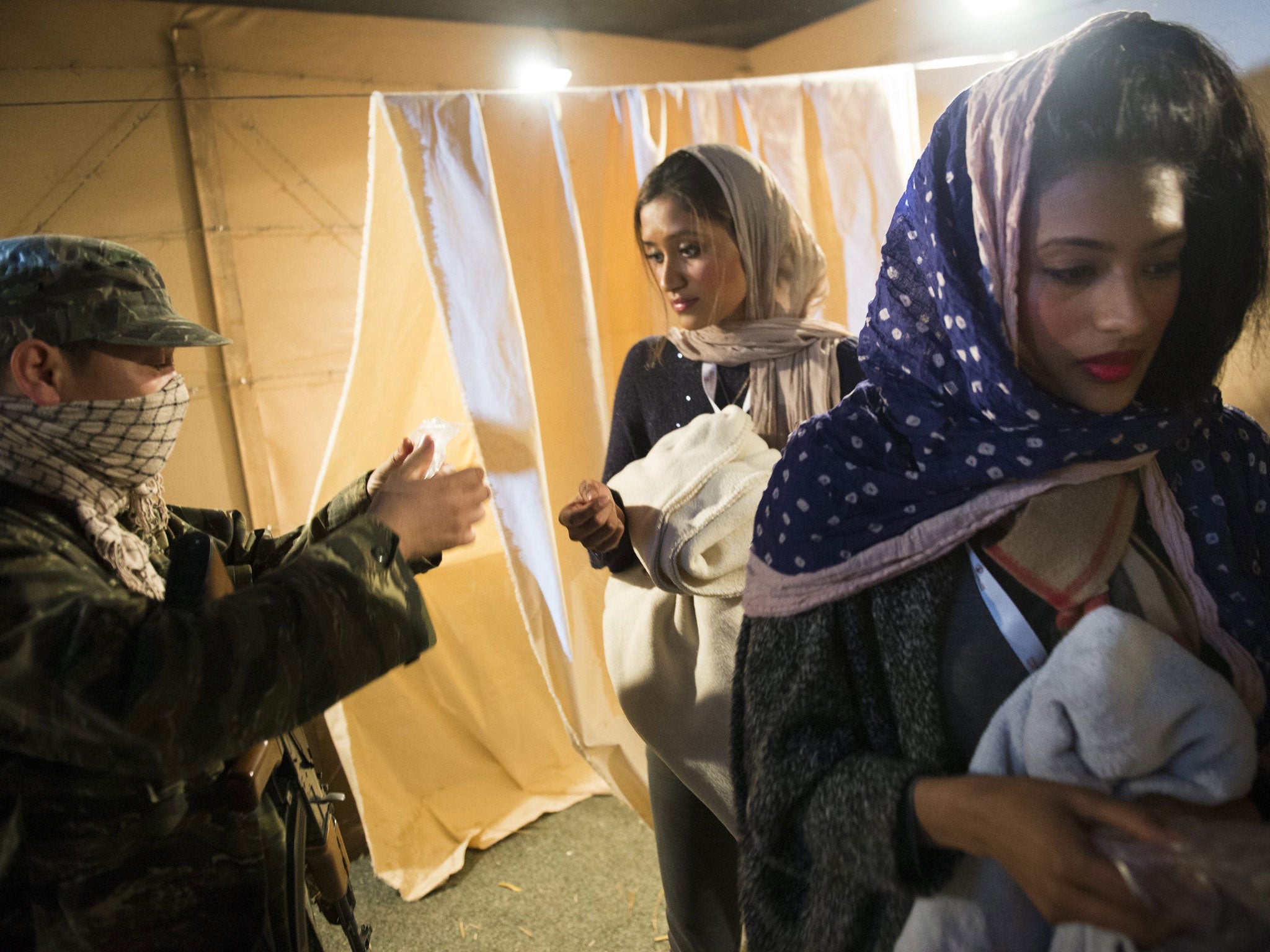The Syrian refugee simulator for billionaires: We try the experience designed to pressure the super-rich into helping

The most agonising choice many attendees of the World Economic Forum in Davos face is whether to go for a Martini or a smooth Riesling at the countless lavish parties that take place after hours.
The extent of the hardship suffered here in the Swiss mountain ski resort is being forced to stay in one of the less opulent hotels, because all the luxury residences at the Belvedere have been booked up by the wealthier oligarchs. The biggest risk is stumbling as you step out of your chauffeured limousine and landing in a mound of fluffy snow.
But this year a charity called the Crossroads Roads foundation sought to inject some trauma into the cosseted lives of the world’s “global elite”, as the hundreds of Wall Street barons, sleek political power brokers and corporate titans that gather in Davos every year like to style themselves. The purpose is to offer an hour-long simulation of what it’s like to be refugee in one of the world’s cruellest places: civil war-wracked Syria.
One might imagine that “Refugee Run” in Davos would be as welcome as an Occupy activist in a banking board room. But there was high demand. You book your session through the World Economic Forum’s high-tech “kiosk” system. Most of the slots were filled early. Among this year’s high-profile participants were Queen Mathilde of Belgium and a smattering of corporate bigwigs including the chairman of Nestle. Facebook’s Sheryl Sandberg, Richard Branson and Ban Ki-Moon have experienced the “run” in the past.
I took up my place yesterday afternoon, just as John McCain, here in Davos, accused the Russians of continuing to supply arms to the Assad regime, which is responsible for much of the misery in Syria.
About 25 of us, most of us with our tell-tale Davos cards still hanging around our necks, stepped tentatively down into the basement of a brutalist concrete school near the congress centre. My first impression was of a cross between a Mike Nelson installation and the “Saw” horror maze at Thorpe park: a dark corridor, dry ice, ominous creaking. Was this to be a kind of worthy entertainment?
You kneel in a carpeted room while an imam-style figure tells you of horrors outside and of the imperative to flee. Then gunshots explode in your ears and balaclava-clad figures rush in and point Kalashnikovs at your head. With your fake ID card in hand (remember your name in case you get interrogated) you stumble into a camp, surrounded by barbed-wire, where angry-eyed soldiers manhandle you into some scratchy brown tents. “On your knees! Those people are kneeling - you think you’re better than they are?” they bark.
Life in the camp is a relentless ordeal. You’re woken in the night to be berated by the heartless commandant. Soldiers spit at you and accuse you of eyeballing them, rather like the drill sergeant in Clockwork Orange. I tell the harassed United Nations camp nurse that I have diahorrea (listed as my medical condition on my ID card) and I’m told they have no medicine left. What do I do then? “Ask one of the soldiers for water”. No thanks. I try the sympathetic kheffiya-clad grocer, who apparently knows my cousin, instead. But he only has bread, I need water. “Bokra” he says – tomorrow, maybe.
One day dawns with a dead woman, with bloody ankles, outstretched before us. We’re told by the soldiers that her ID card and blanket were stripped from her body by someone after she died. We’re castigated as animals for treating one of our own in such a manner. But, of course, our need was greater than hers. One night all the women are rounded up, inspected like horses, and two luckless individuals are led away. God knows what for – better not to think about it.
When the simulation was over we heard testimony from some of the actors, who had been through similar privations in real life. David Livingstone from Uganda looked in our eyes and told us how he had seen two young girls shot right in front of him for asking to leave the camp in which he lived. An aid worker told us of young Syrian child called Karim who works in Lebanon, putting up with physical and sexual abuse from his employer in order to send money back to his family. “At least it’s me and not my sisters” is the thought that allows him to cope. Tears welled in many eyes.
Refugee Run can’t, naturally, make you experience what it’s like to be starving, or genuinely in fear of your life. But it gave this year’s Davos delegates a glimpse. And it makes you think about real people and their contemporary suffering – which is more than can be said for Saw at Thorpe Park.
Join our commenting forum
Join thought-provoking conversations, follow other Independent readers and see their replies
Comments
Bookmark popover
Removed from bookmarks